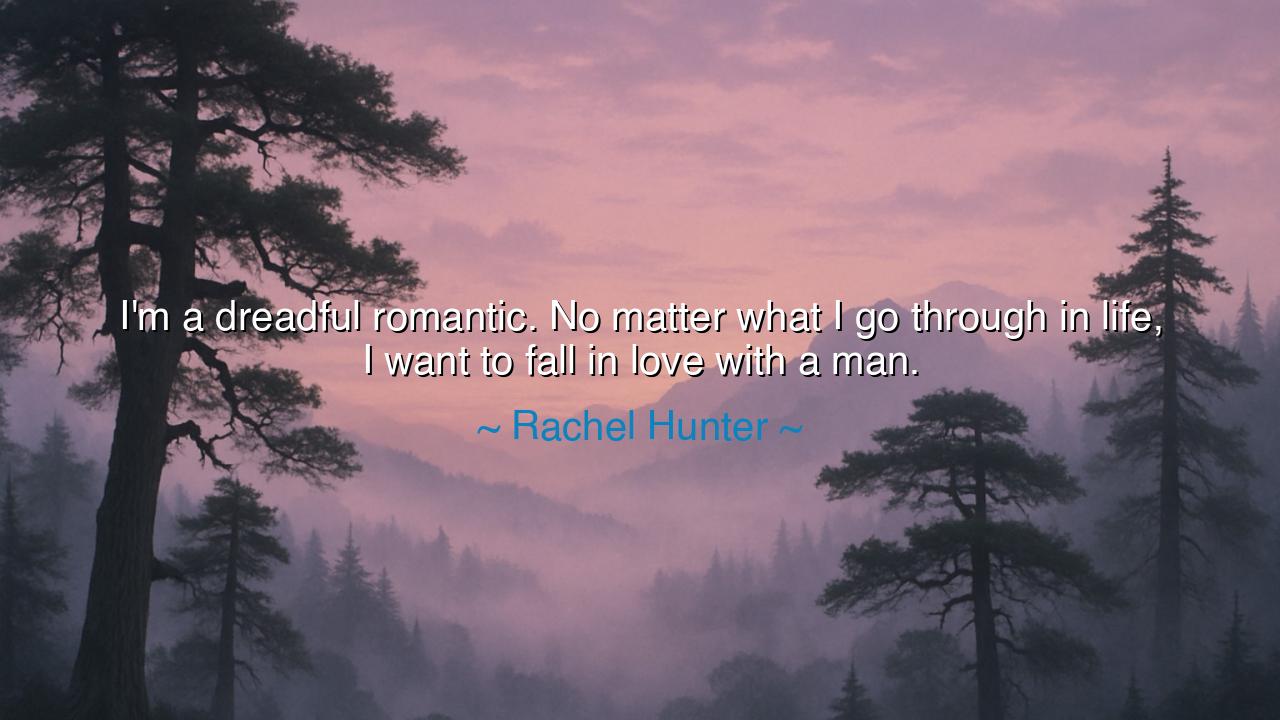
I'm a dreadful romantic. No matter what I go through in life, I
I'm a dreadful romantic. No matter what I go through in life, I want to fall in love with a man.






The words of Rachel Hunter shine with vulnerability and unshaken longing: “I’m a dreadful romantic. No matter what I go through in life, I want to fall in love with a man.” Here she speaks with the voice of one who has known trial, heartbreak, and disappointment, yet who refuses to surrender the hope of romance. To be “dreadful” in this sense is not to be ashamed, but to admit that her hunger for love persists despite all obstacles, as though her soul cannot be separated from its yearning to unite with another.
The ancients would have honored such a spirit. For they believed that love was not merely an emotion, but the very force that binds the universe together. Plato wrote of the soul’s eternal longing for its other half, torn from it in the beginning of time. Hunter’s words echo this same conviction: no matter the storms of life, no matter the scars carved by experience, the heart continues to search for its counterpart. To fall in love, again and again, is not folly—it is the human destiny.
There is also courage in her confession. Many who have endured betrayal or sorrow shield themselves, vowing never to be vulnerable again. Yet Hunter declares that she will not close her heart. She is a dreadful romantic because she insists on opening herself to risk, knowing that to fall in love is to place oneself in the hands of another, uncertain of what may come. Such persistence is not weakness but strength—the strength to keep choosing love over fear, time after time.
Consider the story of Eleanor of Aquitaine, queen of both France and England, who endured political turmoil, imprisonment, and strife. Yet even through power struggles and betrayals, she remained a patron of courtly romance, nurturing the poetry of troubadours and the songs of lovers. Though tested by life’s harshness, she never abandoned her belief in love’s power to ennoble the human spirit. Hunter’s words carry the same flame: that no matter what is lost, the pursuit of love remains the soul’s most sacred endeavor.
In these words we also hear defiance against cynicism. The world often mocks those who continue to believe in love after suffering, calling them foolish or naive. But Hunter transforms that charge into a banner: “I am a dreadful romantic.” She embraces the label, proud of her refusal to grow cold. For what is life without love? What is triumph without someone to share it with, or sorrow without someone to comfort you? The romantic knows that no wealth, no achievement, no renown can replace the simple ecstasy of falling in love.
The lesson is clear: never let hardship strip you of your capacity to love. You may be wounded, you may be disappointed, you may be broken for a time—but do not let bitterness harden your heart. To remain a romantic, even a “dreadful” one, is to keep alive the noblest part of your humanity. It is better to risk heartbreak than to live without ever having known love’s fire.
Therefore, let all who hear these words take action: guard your tenderness, not with walls of stone, but with courage that allows you to open again and again. Do not fear being called foolish; do not shrink from the possibility of pain. Instead, let your life be marked by love’s pursuit, by the refusal to let despair silence the heart’s eternal song. For as Rachel Hunter reminds us, to fall in love is not a weakness—it is the truest expression of strength and hope.
Thus her words stand as both confession and command: be steadfast in romance, endure trials, and never stop reaching for love. For it is not the absence of pain that makes a life great, but the courage to love in spite of it. And in this, the “dreadful romantic” is, in truth, the most heroic of all.






AAdministratorAdministrator
Welcome, honored guests. Please leave a comment, we will respond soon